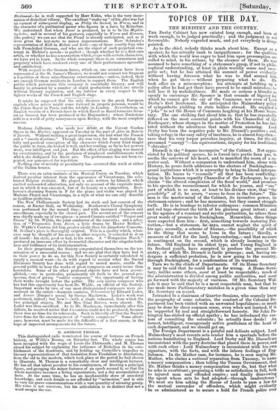There was an extra matinee of the Musical Union on
Tuesday, which derived peculiar interest from the appearance of Vieuxtemps, the cele- brated Belgian violinist. He played a solo written by himself, which excited unbounded admiration, not only on account of the exquisite man- ner in which it was executed, but of its beauty as a composition. Beet- hoven's charming Sonata in F for the piano and violin was played by Madame Pleyel and Vieuxtemps, in a style of what we can only describe as faultless perfection.
The New Philharmonic Society had its sixth and last concert of the season, at Exeter Hall, on Wednesday. Beethoven's Choral Symphony was performed for the second time ; and with increased clearness and smoothness, especially in the choral part. The second act of the concert was chiefly made up of two pieces : a sacred Cantata entitled "Prayer and Praise" by Dr. Wylde, the joint conductor of the concerts ; and a selec- tion of "Fragments from Faust, a lyric drama by Hector Berlioz." Dr. Wylde's Cantata did him greater credit than his pianoforte Concerto. M. Berlioz's piece is thoroughly original. This is a quality which, what- ever may be thought of his music in other respects, is conceded to it on all hands : his style, good or bad, is his own. A "Hungarian March" produced an immense effect by its martial character and the singular bold- ness and brilliancy of its instrumentation.
In their programme the Society congratulated themselves on the ter- mination of a successful season : and we are glad that they have had it in their power to do so, for this New Society is certainly calculated to supply a musical want—to do with regard to secular what the Sacred Harmonic Society has done with regard to sacred music, enable the general public to hear the works of great composers on easier terms than heretofore. Some of its other professed objects have not been accom- plished,—one in particular, prominently set forth in the general pro- spectus, that of giving "native composers" the opportunity of having their works brought before the public. The only native composer who has had this opportunity has been Dr. Wylde, an official of the Society. Important works by two of our most distinguished composers were an- nounced in the outset —dramatic cantatas, Telemachus by Edward Loder, and _Lenore (Burger's poem) by George Macfarren. Loder's work was performed, indeed ; but how ?—with a single rehearsal, from which the two principal singers, Mr. and Mrs. Sims Reeves, were absent. Mr. Loder was thus sacrificed. As to Mr. Macfarren, immediately after this failure, he received notice that his cantata could not be produced, because there was no time for its rehearsals. Such is literally all that the Society have done for the encouragement of "native composers." Some allow- ance, however, must be made for the difficulties of a first season, in the hope of improved arrangements for the future.


























 Previous page
Previous page